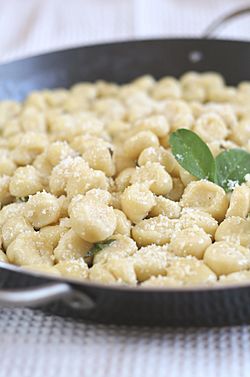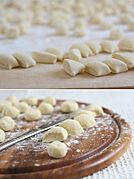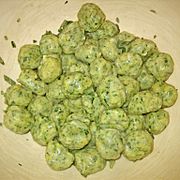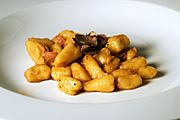Gnocchi facts for kids

|
|
| Type | Dumpling, pasta |
|---|---|
| Course | Entrée |
| Place of origin | Italy |
| Main ingredients | Potatoes, semolina, wheat flour, breadcrumbs; sometimes eggs, cheese |
| Variations | Cavatelli, gnudi, malfatti, malloreddus, strangulaprievete |
Gnocchi (say "NYOK-ee" or "NYOH-kee") are a type of dumpling from Italian cuisine. They are small, soft lumps of dough. Most often, gnocchi are made from wheat flour, eggs, salt, and potatoes.
Sometimes, people add other things to the basic recipe. These can include semolina flour, cheese, breadcrumbs, or cornmeal. They might also add herbs, vegetables, or other ingredients for extra flavor. Some gnocchi are made with sweet potatoes instead of regular potatoes. Others use rice flour instead of wheat flour. These are often seen as less traditional.
To make gnocchi, the dough is usually rolled out. Then, it's cut into small pieces, about the size of a wine cork or smaller. Makers might press the dumplings with a fork or a cheese grater. This creates ridges that help sauces stick better. There are even special tools for this, like a gnocchi board. Gnocchi are usually eaten as a first course in Italy. They can also be a side dish, called a contorno, with some main meals.
Gnocchi recipes and names change across different parts of Italy. For example, in Lombardy and Tuscany, malfatti (meaning "poorly made") are common. These are made with ricotta cheese, flour, and spinach. They might also have other herbs. Tuscan gnudi have less flour. But some gnocchi are mostly flour-based. Examples include strangulaprievete from Campania and cavatelli from Apulia. Malloreddus from Sardinia is another type. Gnocchi are usually cooked in boiling salted water. Then, they are served with different sauces. Some kinds are made from cooked polenta or semolina. These are spread out, layered with cheese and butter, and then baked.
Gnocchi are often eaten as a first course (primo piatto). They are a tasty choice instead of soups or pasta. Popular toppings for gnocchi include melted butter with sage. Pesto sauce is another favorite. Many other sauces are also used. You can make gnocchi at home. You can also buy them from special stores. Factories also make them to be sold chilled, dried, or frozen. Most gnocchi are boiled and then served with a sauce. Small gnocchi for soup are sometimes made by pushing dough through a sieve.
Contents
Origin of Gnocchi
The word gnocchi might come from the Italian word nocchio. This word means a knot in wood. Or it could come from nocca, meaning knuckle. Gnocchi have been a traditional Italian pasta since Roman times. Roman legions brought them to other parts of Europe as the empire grew. One ancient Roman recipe used a semolina-like dough mixed with eggs. Today, similar dishes include baked gnocchi alla romana and Sardinian malloreddus. These do not contain eggs.
After potatoes came to Europe through the Columbian exchange, they were added to gnocchi recipes. Potato gnocchi are very popular in some Italian regions. These include Abruzzo, Friuli-Venezia Giulia, Veneto, and Lazio.
Making and Storing Gnocchi
Storing Gnocchi at Home
If you make gnocchi at home, it's best to eat them the same day. But you can also freeze them for later. First, cut them into small pieces. Spread them out on a baking sheet and freeze them. Once frozen, you can put them into an airtight bag. Then, put the bag back in the freezer. Gnocchi can last up to two months in the freezer this way.
Commercial Gnocchi
Gnocchi sold in stores often come in special packaging. This helps them stay fresh for two weeks or more in the fridge. Some are sold in vacuum-sealed bags. These can stay fresh on a shelf without refrigeration until you open them. Once opened, they need to be kept in the fridge.
Gnocchi Around the World
Gnocchi are enjoyed in many places, often with local twists!
Gnocchi in Italy
Gnocchi di pane (meaning "bread lumps") are popular in Friuli-Venezia Giulia, Veneto, and Trentino-Alto Adige/Südtirol. They are made from breadcrumbs. Another type from Trentino-Alto Adige/Südtirol is spinach gnocchi.
Gnocchi in Austria
In Austria, gnocchi are called nockerl (plural nockerln). They are a common main dish or side dish. For example, they might be served with goulash.
Gnocchi in Croatia
Gnocchi are very popular in coastal Croatia. They are often served as a first course or a side dish. A common pairing is with Dalmatinska pašticada. The Croatian name for gnocchi is 'njoki'.
Gnocchi in Slovenia
In Slovenia, gnocchi are known as "njoki". They are common in the Primorska region. This area shares many food traditions with nearby Italy.
Gnocchi in Poland
Poland has a dish called 'kluski leniwe' ("lazy dumplings"). These are very similar to gnocchi but do not have egg. They are often seasoned with spices like pepper or cinnamon. Another similar shape is kopytka ("hooves"). These are simple diamond-shaped dough dumplings without cheese. Both are often served with sour cream, butter, or mushroom sauce.
Gnocchi in France
In France, there's a dish called gnocchis à la parisienne. This hot dish uses gnocchi made from choux pastry and served with Béchamel sauce. In Nice, a special gnocchi is gnocchi de tantifla a la nissarda. It's made with potatoes, wheat flour, eggs, and blette (Swiss chard). La merda dé can is another type of gnocchi from Nice, which is longer than the usual kind.
Gnocchi in South America
Many Italian immigrants moved to Argentina, Paraguay, and Uruguay. Because of this, gnocchi are very popular there. They are called ñoqui in Spanish and nhoque in Portuguese. In Uruguay, Paraguay, and Argentina, there's a tradition of eating gnocchi on the 29th of each month. Some people even put money under their plates for good luck and prosperity!
Gallery
See also
 In Spanish: Ñoqui para niños
In Spanish: Ñoqui para niños
 | Charles R. Drew |
 | Benjamin Banneker |
 | Jane C. Wright |
 | Roger Arliner Young |




